You can use [PyPI]: pyOpenSSL.
I'll base my example on the certificate from [SO]: How can I decode a SSL certificate using python?.

code.py:
#!/usr/bin/env python3
import sys
from OpenSSL import crypto
IN_FILE = "./in.crt"
OUT_FILE = "./out.pfx"
def main():
with open(IN_FILE, "rb") as fin:
pem_text = fin.read()
print("Input length: {:d}".format(len(pem_text)))
cert = crypto.load_certificate(crypto.FILETYPE_PEM, pem_text)
print("CERTIFICATE DATA\n Serial: 0x{:X}\n Issuer: {:}\n Subject: {:}\n Not before: {:}\n Not after: {:}".format(
cert.get_serial_number(), cert.get_issuer(), cert.get_subject(), cert.get_notBefore(), cert.get_notAfter()))
p12 = crypto.PKCS12()
p12.set_certificate(cert)
p12_text = p12.export()
print("Output length: {:d}".format(len(p12_text)))
with open(OUT_FILE, "wb") as fout:
fout.write(p12_text)
print("Done.")
if __name__ == "__main__":
print("Python {:s} on {:s}\n".format(sys.version, sys.platform))
main()
Output:
e:\Work\Dev\StackOverflow\q054562125>"e:\Work\Dev\VEnvs\py_064_03.06.08_test0\Scripts\python.exe" code.py
Python 3.6.8 (tags/v3.6.8:3c6b436a57, Dec 24 2018, 00:16:47) [MSC v.1916 64 bit (AMD64)] on win32
Input length: 2544
CERTIFICATE DATA
Serial: 0xE77768A5D07F0E57959CA2A9D5082B5
Issuer: <X509Name object '/C=US/O=DigiCert Inc/OU=www.digicert.com/CN=DigiCert High Assurance EV CA-1'>
Subject: <X509Name object '/businessCategory=Private Organization/jurisdictionC=US/jurisdictionST=California/serialNumber=C3268102/C=US/ST=California/L=San Francisco/O=GitHub, Inc./CN=github.com'>
Not before: b'20110527000000Z'
Not after: b'20130729120000Z'
Output length: 2044
Done.
And the PFX test (in Cygwin console):
[cfati@cfati-5510-0:/cygdrive/e/Work/Dev/StackOverflow/q054562125]> ls
code.py in.crt out.pfx
[cfati@cfati-5510-0:/cygdrive/e/Work/Dev/StackOverflow/q054562125]> certutil -dumpPFX out.pfx
Version: 3
1.2.840.113549.1.7.1 PKCS 7 Data
authSafe count: 1
----------------------------------------------------------------
authSafe[0]:
1.2.840.113549.1.7.6 PKCS 7 Encrypted
Version: 0
Content Type: 1.2.840.113549.1.7.1 PKCS 7 Data
Content Encryption Algorithm: 1.2.840.113549.1.12.1.3 szOID_PKCS_12_pbeWithSHA1And3KeyTripleDES
Algorithm Parameters:
0000: 30 0e ; SEQUENCE (e Bytes)
0002: 04 08 ; OCTET_STRING (8 Bytes)
0004: | d3 21 37 37 7a 70 e7 08 ; .!77zp..
000c: 02 02 ; INTEGER (2 Bytes)
000e: 08 00
Decrypted content:
bagId: 1.2.840.113549.1.12.10.1.3 szOID_PKCS_12_CERT_BAG
1.2.840.113549.1.9.22.1 szOID_PKCS_12_CERT_TYPE_X509
================ Begin Nesting Level 1 ================
Serial Number: 0e77768a5d07f0e57959ca2a9d5082b5
Issuer: CN=DigiCert High Assurance EV CA-1, OU=www.digicert.com, O=DigiCert Inc, C=US
NotBefore: 2011-05-27 02:00
NotAfter: 2013-07-29 14:00
Subject: CN=github.com, O=GitHub, Inc., L=San Francisco, S=California, C=US, SERIALNUMBER=C3268102, OID.1.3.6.1.4.1.311.60.2.1.2=California, OID.1.3.6.1.4.1.311.60.2.1.3=US, OID.2.5.4.15=Private Organization
Non-root Certificate
Cert Hash(sha1): ce6799252cac78127d94b5622c31c516a6347353
---------------- End Nesting Level 1 ----------------
----------------------------------------------------------------
Hash Algorithm: 1.3.14.3.2.26 sha1 (sha1NoSign)
Mac:
8fe6e58f236fa353ff5c7375a35c0aab062ccee9
Salt:
034c9198964b2ed2
Iteration count (Default): 1
Computed Mac:
8fe6e58f236fa353ff5c7375a35c0aab062ccee9
CertUtil: -dumpPFX command completed successfully.
